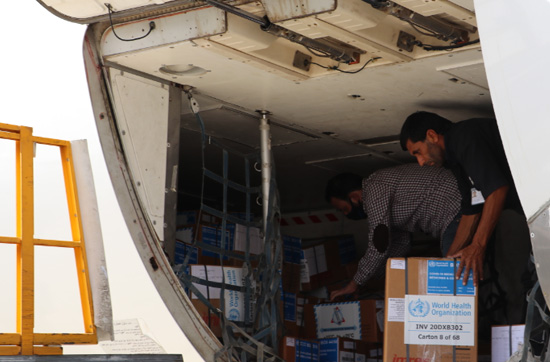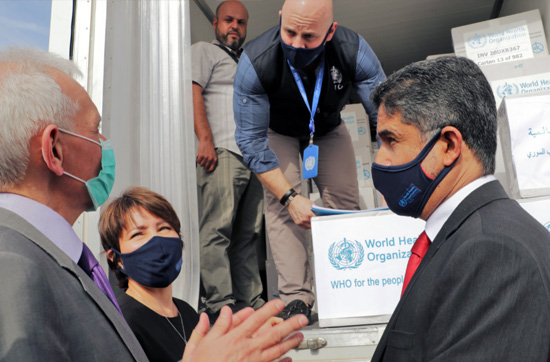 24 October 2020, Damascus, Syria – A chartered aircraft has landed in Damascus International Airport from the WHO's logistics hub in Dubai, carrying WHO supplies to support the health response in Syria. The 8.8-ton shipment includes medical kits and medicines for almost 2000 beneficiaries and enough personal protective equipment to protect more than 4000 health care workers.
24 October 2020, Damascus, Syria – A chartered aircraft has landed in Damascus International Airport from the WHO's logistics hub in Dubai, carrying WHO supplies to support the health response in Syria. The 8.8-ton shipment includes medical kits and medicines for almost 2000 beneficiaries and enough personal protective equipment to protect more than 4000 health care workers.
“Health care workers are the backbone of any health system, and protecting them is protection for us all,” said Dr Al-Mandhari, WHO Regional Director for the Eastern Mediterranean Region, who handed over the supplies to health authorities soon after he arrived in Damascus today for a five-day mission.
“These supplies will strengthen the health sector’s response against COVID-19 across Syria. One of our main priorities is to take measures to maintain the safety of all medical staff and front-liners in health facilities who are sparing no effort to respond to this pandemic despite the challenges on the ground,” Dr Al-Mandhari added.
 The humanitarian shipment arrives at a critical time, when Syria, like many countries in the Region, is expecting a surge in the number of COVID-19 cases. As part of preparedness and response, WHO is working closely with all partners to strengthen surveillance, enhance testing and laboratory capacity, support health services, and ensure the delivery of life-saving medicine and equipment.
The humanitarian shipment arrives at a critical time, when Syria, like many countries in the Region, is expecting a surge in the number of COVID-19 cases. As part of preparedness and response, WHO is working closely with all partners to strengthen surveillance, enhance testing and laboratory capacity, support health services, and ensure the delivery of life-saving medicine and equipment.
As a result of the 10-year conflict and its impact on the national health system, WHO classifies Syria among high-risk countries in the Region, due to devastated health infrastructure and limited availability of health care services. International sanctions further hinder Syria’s national capacity to cope with the COVID-19 pandemic, causing an unprecedented socioeconomic burden on the Syrian people.




